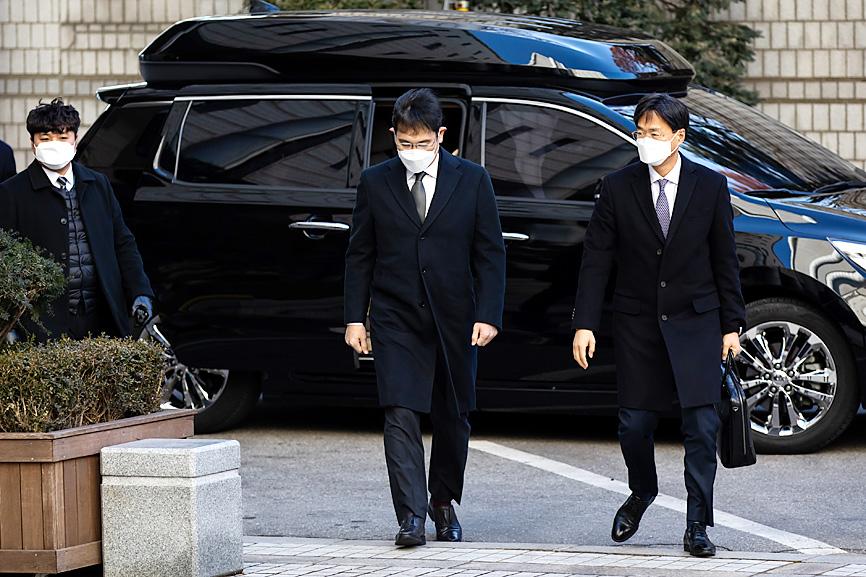South Korean prosecutors yesterday requested a nine-year prison term for Samsung Group chairman Jay Y. Lee, seeking to put the heir apparent back in jail in a bribery case that rocked the nation and ignited a backlash against its most powerful conglomerates.
Special prosecutors proposed the sentence during a hearing at the Seoul High Court, which is to make its ruling in the next few months.
“There’s no denying that it has made a lot of positive impact on our society, but just because there’s been an economic contribution, there should be no hesitation in legal enforcement based on the rule of law,” a transcript of closing arguments from prosecutors said, referring to Samsung.

Photo: Bloomberg
The 52-year-old billionaire is fighting allegations of graft in a retrial of a case that started four years ago, and led to his imprisonment and the ouster of former South Korean president Park Geun-hye.
The outcome of the case could snarl succession at Samsung Electronics Co, just as Lee is expected to formally take the helm of the mobile and electronics giant after the death of his father in October.
The executive stands accused of making gifts to cement his control over the world’s largest smartphone maker and smooth his ascension.
Lee served a year in jail before his release in 2018 after an initial five-year prison term was halved and suspended by an appeals court.
However, in August, the Supreme Court voided that decision, thrusting the executive back before a judge.
Lee faced a tougher sentence this time — a minimum of five years — because the amount of alleged bribery acknowledged by the top court increased.
Yet experts viewed a decreasing chance of imprisonment as the trial drew to a close.
Judges at the high court asked Samsung and Lee to impose measures to prevent illegal activity, and improve credibility among the group.
Lee responded by setting up an independent compliance committee and issuing a personal apology in May over past wrongdoings related to the succession process.
He also pledged publicly not to hand down leadership of South Korea’s largest conglomerate to his children.
The compliance committee’s activities are to be factored into Lee’s eventual sentencing.
The bribery allegations stem from a merger in 2015 between two Samsung units that helped Lee gain control over the group.
Prosecutors argued that Samsung offered horses and financial contributions, via an intermediary, to a confidante of Park to try and win the government’s support for the deal.
Lee, who stepped down from an internal director post, remains Samsung Electronics’ vice chairman and de facto leader.
Although his father and company chairman, Lee Kun-hee, died in October, the Samsung scion has not been immediately crowned his successor.
Samsung Electronics is likely to hold off on naming him to that role at least until the trial is completed.
Separately, Jay Lee is embroiled in another trial related to the 2015 merger, with allegations ranging from contraventions of capital market laws to breach of duty.
Prosecutors in September indicted Jay Lee and hearings are set to resume on Jan. 14.

SEEKING CLARITY: Washington should not adopt measures that create uncertainties for ‘existing semiconductor investments,’ TSMC said referring to its US$165 billion in the US Taiwan Semiconductor Manufacturing Co (TSMC, 台積電) told the US that any future tariffs on Taiwanese semiconductors could reduce demand for chips and derail its pledge to increase its investment in Arizona. “New import restrictions could jeopardize current US leadership in the competitive technology industry and create uncertainties for many committed semiconductor capital projects in the US, including TSMC Arizona’s significant investment plan in Phoenix,” the chipmaker wrote in a letter to the US Department of Commerce. TSMC issued the warning in response to a solicitation for comments by the department on a possible tariff on semiconductor imports by US President Donald Trump’s

The government has launched a three-pronged strategy to attract local and international talent, aiming to position Taiwan as a new global hub following Nvidia Corp’s announcement that it has chosen Taipei as the site of its Taiwan headquarters. Nvidia cofounder and CEO Jensen Huang (黃仁勳) on Monday last week announced during his keynote speech at the Computex trade show in Taipei that the Nvidia Constellation, the company’s planned Taiwan headquarters, would be located in the Beitou-Shilin Technology Park (北投士林科技園區) in Taipei. Huang’s decision to establish a base in Taiwan is “primarily due to Taiwan’s talent pool and its strength in the semiconductor

An earnings report from semiconductor giant and artificial intelligence (AI) bellwether Nvidia Corp takes center stage for Wall Street this week, as stocks hit a speed bump of worries over US federal deficits driving up Treasury yields. US equities pulled back last week after a torrid rally, as investors turned their attention to tax and spending legislation poised to swell the US government’s US$36 trillion in debt. Long-dated US Treasury yields rose amid the fiscal worries, with the 30-year yield topping 5 percent and hitting its highest level since late 2023. Stocks were dealt another blow on Friday when US President Donald

UNCERTAINTY: Investors remain worried that trade negotiations with Washington could go poorly, given Trump’s inconsistency on tariffs in his second term, experts said The consumer confidence index this month fell for a ninth consecutive month to its lowest level in 13 months, as global trade uncertainties and tariff risks cloud Taiwan’s economic outlook, a survey released yesterday by National Central University found. The biggest decline came from the timing for stock investments, which plunged 11.82 points to 26.82, underscoring bleak investor confidence, it said. “Although the TAIEX reclaimed the 21,000-point mark after the US and China agreed to bury the hatchet for 90 days, investors remain worried that the situation would turn sour later,” said Dachrahn Wu (吳大任), director of the university’s Research Center for